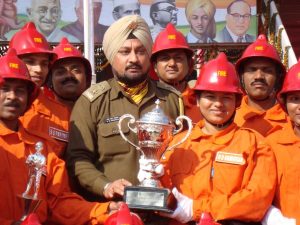Today is World Firefighters Day
Saurabh Tankha
You may receive laurels, applauses and honours. Your name may be etched in golden words in history or record books. But the fact remains that except you no one knows how much of hard work was put in to achieve it all, what challenges did you have to face to reach here and how many sacrifices did you have to make? And when you happen to be treading into a male-dominated domain, the magnanimity of all these factors increases manifold. So it happened with Harshini Kanhekar Urankar, the country’s first firewoman.
“I had no intention of entering a field dominated by men. It was all destiny. During my BSc days at Nagpur’s Lady Amritbai Daga College, I was also a cadet in the NCC’s Air Wing. It was there that I saw a few officers wearing uniform. So impressed did I get that I decided there and then on wearing uniform one day. In fact, I turned it into my dream,” says Harshini.

As luck would have it, one of her friends came to her sometime later and told her that if she wanted to wear uniform, a golden opportunity had come her way. “You could apply at the National Fire Service College (NFSC). The forms have just been released and they have a uniform which you have always dreamt of wearing one day,” Harshini says, adding that even after she purchased, filled and the form and submitted the form, she didn’t know what was in store for her. “Not even that the college had never had girl students,” she puts in.
The Kanhekar home had forever been the hub of education, the credit for which Harshini gives to her parents, especially her father. “A retired executive engineer of the irrigation department, my father was forever interested in the three of us (my two elder siblings – an elder brother and an elder sister) getting loads of education. Whenever we purchased a form for a course, he was the first one to get involved by finding the course it had, the related books and more,” says the firewoman. She also shares that her father got her mother to complete graduation through open university when Harshini was in class VI. “Such was the atmosphere at home. Education for everyone was equal. No distinctions between my brother and us sisters,” she puts in. In fact, her sister and she got more attention than their brother.
The equality Harshini experienced at home, especially when it came to education, helped boost her confidence throughout her life. She reminisces the day when she went to submit the form at the fire college with a friend. “One person from the college told me that it was a boy’s college. I told him such a thing was not mentioned in the application form and that being a BSc graduate was the only requisite. In reply, I was told they knew the rules more as they taught there. ‘Go, try army or air force. This one isn’t for you’ he said. Imagine a man telling this to a woman in the year 2002 when women had entered and mastered all possible fields. But I am thankful to that person told me so though I had felt really angry then but controlled it. I folded the form, pushed it in the drop box and left. At that point, I decided come whatever may, I have to take admission here for sure. I need to show them what I can do,” she says.
So, Harshini appeared for the entrance exam, passed it and got herself the uniform stitched she was always so passionate about before she walked into the college for the first time. “Wearing the uniform was an experience I can never narrate,” she says. Though the three-and-a-half year course at NFSC is a residential one, special permission was taken from the Ministry of Home Affairs, Government of India, to let Harshini study as a day scholar as there were no facilities for women at the college. “No woman had ever entered the gates of the college to study before me so it was amiss. To be the first woman among all those men was challenging but interesting. The best part was that no special concessions were extended to me for being a woman during the course,” shares Harshini who has been conferred with NITI Aayog’s Women Transforming India award and the ‘First Ladies’ award.
After three years, she completed the mandatory training period of six months, three each in Kolkata and Delhi. “Though there were no fires in Kolkata during this period, I was part of the teams that did a few firefights. Now, after so many years, I have lost track of how many have I been a part of. The aim is to douse the fire and save lives and property,” says she.
Harshini thereafter joined the Mehsana fire station in Gujarat in 2006. It happens to be the second largest onshore production field of ONGC. Mehsana has more than 50 oil installations that fall under the jurisdiction of three fire stations. Harshini has always been a station in-charge at either of the three stations for the better part of her career.
Elated to have opened the doors for women to enter fire colleges, Harshini is an avid biker who loves making rangolis and listening and playing the guitar. Married to her best friend, Pranish Urankar, the couple now has a baby. Ask how she manages work and home and Harshini says with a smile, “If you have a strong family support, especially understanding husband and in-laws, all this is a cakewalk. The reason I waited to get married at 37 was to be sure about all these factors.”